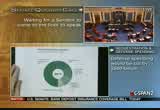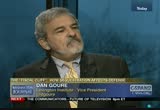tv U.S. Senate CSPAN December 10, 2012 5:00pm-8:00pm EST
5:45 pm
mr. blumenthal: i ask that the quorum call be vitiated. the presiding officer: without objection. mr. blumenthal: i ask to speak in morning business. the presiding officer: without objection. mr. blumenthal: thank you, mr. president. i rise today on human rights day. there are a plethora of days in this nation known for various causes, for issues, and for historical occurrences. human rights day is fundamentally american. the rights of human beings are the reason that this nation was founded and the motivation for the war that was fought to free us from england, and to make us free. human rights day is about advancing equality and the american constitution as it has expanded over the years to
5:46 pm
include new groups of people and strike down barriers of race and gender, ethnic background, national origin. it is about the progress of human rights and equality, the noblest of causes for this nation and what brings us together in many ways as americans. the fight for freedom. the search for equality. and justice. and i want to talk about three specific ways that we can advance the cause of human rights in this chamber, in this session through measures that are before us. the first concerns human trafficking. i've been particularly interested in the rampant human trafficking problems on american bases abroad in places like iraq and afghanistan. victims are recruited from third countries like bangladesh and the philippines and charged
5:47 pm
exorbitant fees to travel to their work sites often misled about where they're going, what that are salaries will be and what their living conditions will be like. frequently their passports are confiscated so they cannot in fact return home, even if they're able to scrape together the money to make that journey. this kind of human trafficking is no less than modern-day slavery, subsidized by our government with taxpayer money. it's reprehensible. but for me, the number-one issue here is the safety of our american troops on these bases. that safety is compromised if our bases are filled with unauthorized, potentially unsafe foreign workers. and that's why i introduced the end trafficking in government contracting act of treft which provides the -- of 2012 which provides the most comprehensive
5:48 pm
approach taken. it is bipartisan legislation which now is included in the bill which passed the senate last week and i'm hopeful will be retained in conference and signed into law soon, with strong bipartisan support from my colleague, senator portman, of ohio. in addition, i want to thank senator leahy for advancing the trafficking victims reauthorization protection act known by tvpra which takes a an even more inclusive view this have problem to make sure america stands against human trafficking rather than complicit in it. the second issue that i want to raise is the violence against women act which continues to be stalled in the house of representatives. tragically, inkpraoe -- income
5:49 pm
prehencively, passed by this body it has not been approved by a form acceptable to the house of representatives. reauthorizing vawa is a top priority for me and many in this body, and my hope is that the house of representatives will act in the final weeks of this session. vawa is a landmark statute aimed at combatting domestic violence, sexual assault, stalking. it provides billions of dollars to support investigation and prosecutions of vicious, heinous acts. and it provides remedies and protection for assaulted women. on this day, when we celebrate human rights, what better way than to commemorate the advance that vawa made in fighting violence against women and to
5:50 pm
broaden its provisions so as to protect native americans and immigrants in this country and gay and lesbian and that community. that is the nature of our democracy. we advance human rights. we make them more inclusive. we broaden their provision. and this legislation is badly needed so that it can be reauthorized. and finally i want to talk about the dream act, which really should be part of immigration reform in this country. i think the vast majority of the members of the united states senate have accepted and indeed espoused the need for thorough comprehensive immigration reform. that kind of reform should include the dream act. i've spoken about it on many occasions, and on many of those
5:51 pm
occasions i have presented to this body an individual story, as i have, for example, solange and bring her photograph with me today. a young woman of enormous promise who simply wants to stay in this country, have a path to citizenship having been brought here at the age of 12 years old, brought here -- didn't choose to come. she was brought here through no fault or doing of her own. and this is her country. this is where her friends are. this is the language she speaks. she lives in east haven, connecticut, where she attended school and she thrived there becoming a member of the national honor society. she's on the executive board of the student council. she's president of the interact club. she was born in colombia, but her roots are in america.
5:52 pm
and she has dreams and goals for the future, like any young woman her age. and she is proud of her connection, her roots in this country. she wants to go to college. but for so long has feared that she would not be able to go. and very briefly, she is eligible to apply for the deferred action program announced by the administration, but that program would simply give her a reprieve without the security and certainty that she needs to advance and continue her schooling. that is the path to citizenship that our dreamers need and deserve. so that they can go to school, serve in our military, give back to this country, earn their citizenship through deeds. not just words, but deeds that
5:53 pm
make us all proud and contribute to the quality of life in our nation. that's what they want to do, is to earn citizenship that so many of us take for granted and that so many people in this country have as a birthright without the effort that she will devote to becoming a united states citizen. we have great citizens born here, who value and prize their citizenship. but solange is one who deserves a path and the ability to earn it through her deeds and her accomplishments in school and afterward. on this human rights day, i thank this body for giving me the honor. it is an extraordinary honor to say how much human rights mean in this country.
5:54 pm
we are the paragon of equality and freedom and rights. we are the greatest nation in the history of the world. we are still a work in progress. we still have progress to make. and these three measures will help us to do it. thank you, mr. president. and i yield the floor. i note the absence of a quorum. the presiding officer: the clerk will call the roll. quorum call:
5:55 pm
mr. blumenthal: mr. president? the presiding officer: the senator from connecticut is recognized. mr. blumenthal: thank you, mr. president. mr. president, i ask unanimous consent that the senate proceed to a period of -- the presiding officer: the senator from connecticut is reminded we're currently in a quorum call. mr. blumenthal: i apologize,
5:56 pm
mr. president. i ask that the quorum call be lifted. the presiding officer: without objection. mr. blumenthal: mr. president, i ask unanimous consent that the senate proceed to a period of morning business with senators permitted to speak therein for up to ten minutes each. the presiding officer: without objection. mr. blumenthal: i ask unanimous consent that at a time to be determined by the majority leader in consultation with the republican leader the senate proceed to executive session to consider the following nominations: calendar 762 and 829, and that there be 30 minutes for debate equally divided in the usual form. that following the use or yielding back of time the senate proceed to vote without intervening action or debate on calendar 762 and 829 in that order. the motions to reconsider be made and laid on the table with no intervening action or debate, that no further motions be in order, that any related
5:57 pm
statements be printed in the record and that the president be immediately notified of the senate's action and that the senate then resume legislative session. the presiding officer: without objection. mr. blumenthal: thank you, mr. president. mr. president, i ask unanimous consent that the senate proceed to the immediate consideration of h.r. 3187, which was received from the house and is at the desk. the presiding officer: the clerk will report. the clerk: h.r. 3187, an act to require the secretary of the treasury to mint coins in recognition and celebration of the 75th anniversary of the establishment of the march of dimes foundation. the presiding officer: is there objection to proceeding to the measure? without objection. mr. blumenthal: thank you, mr. president. i ask unanimous consent that the bill be read three times and passed, the motion to reconsider be laid on the table with no intervening action or debate, and any statements related to
5:58 pm
the bill be placed in the record at the appropriate place as if read. the presiding officer: without objection. mr. blumenthal: thank you, mr. president. i ask unanimous consent that the senate proceed to the consideration of senate resolution 612 submitted earlier today. the presiding officer: the clerk will report. the clerk: senate resolution 612, honoring the life and legacy of the honorable arlen specter, distinguished former senator for the commonwealth of pennsylvania. the presiding officer: is there objection to proceeding to the measure? without objection. mr. blumenthal: thank you, mr. president. i ask unanimous consent the resolution be agreed to, the preamble be agreed to, the motion to reconsider be laid upon the table with no intervening action or debate or debate, and any statements relating to the matter be placed in the record as if read. the presiding officer: without objection. mr. blumenthal: thank you, mr. president. i ask unanimous consent, mr. president, that when the
5:59 pm
senate completes its business today it adjourn until 10:00 a.m. on tuesday, december 11, 2012. that following the prayer and pledge, the journal of proceedings be approved to date, the morning hour deemed expired and the time for the two leaders be reserved for their use later in the day. that following any leader remarks, the senate be in a period of morning business for one hour with senators permitted to speak therein for up to ten minutes each, with the time equally divided and controlled between the two leaders or their designees, with the majority controlling the first half and the republicans controlling the final half. and that following morning business, the senate resume consideration of the motion to proceed to senate 3637, the tag extension legislation, with the time until 12:30 p.m. equally divided and controlled between the two leaders or their
6:00 pm
designees. further, that the senate recess from 12:30 p.m. until 2:15 p.m. to allow for the weekly caucus meetings. the presiding officer: without objection. mr. blumenthal: at 2:15 p.m. tomorrow, there will be a cloture vote to proceed to the tag extension legislation. if there is no further business mr. president, to come before the senate, i ask that it adjourn under the provisions of senate resolution 612 as a further mark of respect to the late senator arlen specter of pennsylvania. the presiding officer: under the previous order and pursuant to s. res. 612, the senate stands adjourned until 10:00 a.m. tomorrow and does so as a further mark of respect to the memory of former senator arlen memory of former senator arlen
6:01 pm
6:02 pm
the show with the duck a guide or a certain food channel networks, i don't think that if i had to of predetermined that was my preference of ever picked them but the ability to stumble on the war to hear people talking about them and let me go into an environment and go kind of gambling around in that and suddenly find, you know what, i sort of like it and i'm watching it. i still think that is a huge park of the american television experience, and i think it gets sold short when you get techno ecstatic talking about anytime, anywhere. i do still think a lot of americans love the enjoyment of escapism and passivity and being able to just kind of rumor around the tv jungle of finding the things that they did not know were there. >> michael powell and the future of television to 98:00 eastern on "the communicators" on c-span2. >> a forum on the iranian
6:03 pm
nuclear program. part of an event recently hosted by the foundation for defense of democracy here in washington d.c. this is just over 40 minutes. >> great. thanks very much, david. thank you to all of you. thank you, senator casey. grateful for your remarks and service. we are going to do a topic that is going to sound technical, non-proliferation policy in the wake of the arab spring, but i want to put this to some human terms. this is the sum of all of your panel. i spent the entire night last night time to think of a way to do this and entertaining and humorous way. there is no such a way. this is about weapons of mass destruction in the middle east. it is a serious topic, and we have very serious experts. people who are the leading rights in non-proliferation. joe had the privilege of spending a year working with in
6:04 pm
a project on the lease nonproliferation, and we're going to have a very detailed report that we will be issuing in january. well over 100 pages already. very specific recommendations on how to deal with this grave threat. we have talked about the iranian nuclear program, the pursuit of nuclear weapons, the implications to the ad states, israel, our allies, the possibility for the cascaded proliferation throughout the middle east which could lead to multiple middle east countries with nuclear weapons on a hair trigger where by intention or by accident you can lead to a nuclear confederation. we spent the morning talking about syria. the regime with one of the large stockpiles of chemical weapons in the world and biological weapons. a man who has slaughtered 40,000 as some people and clearly is capable of slaughtering many, many more. and i certainly learned a lot from these individuals who are sitting here. one thing i learned just the
6:05 pm
other day which i was aware of actually from the board is that since world war ii in the least has seen more weapons of mass destruction attacks than any other place on earth. just to go through the list here which may or may not be aware of, egyptians use toggle weapons against yemen between 1963 and 1967. in 1986 the iraqis used chemical weapons against iranians and it is reported that iranians use chemical weapons against iraqis. in 1987 as a chemical weapons against chad. and, of course, as most of you remember, saddam hussein used mustard gas against the kurds. and those of the years when the middle east was stable. think about that. that was when stability brought. well, now we're in the middle of the great arab revolt. the great arab revolt means that
6:06 pm
these middle eastern governments brought so-called stability have come down and now we have political foes very easily that could be at each other's throats . so the stakes are extraordinarily high, and i want to turn right to the panel. to my right. they are here in their personal capacities. there are the world's leading rights on non-proliferation, so let's jump right into it. iran, when will they get in a clear weapon? >> it is not inevitable. i think whether they will not will depend on what we do, and a is hard to gauge when they may decide to try to get a bomb. certainly the current strategy is to prevent that. a lot of administration is making clear they want to prevent and they have made clear
6:07 pm
they want to prevent the bomb. getting a certain amount of nuclear weapons capabilities. i think iran perceives it is risky to try to get the nuclear weapon at this time. in essence, they are deterred from trying. we would argue that they would have had a nuclear weapon by now if it had not been for all the actions of the international community over the last ten years. so if they are determined now will they be in the future? and one of the -- and a technical organization, one of the wars we have is that if it is easy for them to get a bomb they will be more likely to make the decision to do it. there have been other cases with a knowledge weapon states where once they had the capability, the technical capability, the political decision to do so was a lot easier. and in the case of iran, when we look forward to memorial lot about the next -- year from now, two years from now where they
6:08 pm
could innocents-to nuclear-weapons, maybe get enough weapons-grade uranium that there is enough time for the international community to respond for the nuclear capabilities a growing so fast that, perhaps, in 2014 there will actually have a secret ability and they could produce weapons-grade uranium in sufficient quantities for a bomb and we wanted to know happened until they cease to reveal it. so i think it can be prevented. the many methods being developed , some by this organization. very creative to keep the pressure on iran, keep deterring them, but i think in the future those methods are going to be required to do a lot more if in order to prevent iran from getting a bomb, and i think from as we often use 2014 as the time when we really need to worry that we won't have the methods in place to stop them.
6:09 pm
>> just a press you on this a bit more. first of all, when in 2014? >> can say. we are not that precise. i would say late 2013 and even 2015. and i would say, the actions today in the late. for example, you worry about their stock of 20% low enriched uranium. they are being pressed clearly, by israel statement to keep the stock below a certain amount. and they may do that. they may decide that, okay, it's not worth the risk to keep letting that stock grow and grow and grow. if they let it grow and grow and grow and they can break up more quickly. i think, again, a lot depends on all we do. >> let's talk a little bit about what we can do. i wanted to ask you. president obama has made it clear the policy of his administration is to prevent iran from obtaining a nuclear weapon. there's a lot of talk in the
6:10 pm
town, maybe too much talk about the policy of containment or deterrence. can you tell us why the containment or deterrence? >> sure. the three major reasons you can't rely on deterrent for detainment. first of all, the possibility that a runs nuclear bombs might be used, either because the regime itself is messianic to be under terrible or because rogue elements get ahold of nuclear-weapons and use them or transfer. we saw what happened in pakistan the moderate regime. got hold of nuclear secrets which it developed and transferred to a variety of countries. what happened cannot transfer actual nuclear bombs. you also have to worry about this miscalculation. people say, well, you know,
6:11 pm
mutual assured destruction marched between the u.s. and the soviet union. well, if you look at the history, it actually came very, very close a couple of times, particularly on three occasions. one was the cuban missile crisis . another time was actually less well-known, during the yom kippur war. but in the jerusalem post, a book written about this describing how the american and soviet navies were circling watching each other, get so tired, they almost made a mistake and pulled the nuclear trigger and each other. and finally, just sort of more innocent mistakes, if you look at an example in the 1980's, boris yeltsin, the president of russia, the norwegians had a
6:12 pm
zero weather rocket that they launched in the direction of russia. then notify the russians, but this time the notification got lost in the mail. the russian generals came and said, look, apparently somebody has lost something in us across our horizon. this is an american nuclear attack you have to miss the launch or russia will be obliterated with no shots back. thankfully was sober that date. relations were good between the u.s. and the soviet union. he said to me you know, it can't be the americans attacking. when you talk about the u.s. and iran, is drolen iran, flight times, the attention, the chances of something going wrong , the escalation ending in disaster, that much higher. finally, you also have to be concerned about iran with a nuclear umbrella. oh, well, being more responsive.
6:13 pm
actually, history argues otherwise. if you look at pakistan, they became much more aggressive after they got. they started attacking in india knowing that the indians wanted to avoid getting into a nuclear exchange. if you have nukes and you are more aggressive than the other guy you can go farther than you would if you didn't. it's called the stability instability. those who want to look up. finally, as was mentioned before , the corporations in the middle east, the saudi king told them, if the iranians did nukes, we will also. and from there to other countries may follow. and in the country as fraught with tension as the middle east, you don't want to have a cascade . >> so, just talk about this cascade. in your view, this great arab revolt, the so-called era spring. has it changed the proliferation intentions our policies with
6:14 pm
government in the region? better or worse? >> put an exact science. what i can say is that the sense that there is more about what is going on, more consciousness. certainly when you looked at the issue, the slippage of authority that happened in the region and, particularly in the case of libya where they had a stockpile disappear, that has caused great alarm about how secure the stockpiles are throat region. of course, we have all been talking about chemical weapons in syria as another major concern. so, in that regard there are concerns. as more testimony to this, the personal thing : last three years the u.s. central command, the strategic study has been co hosting an annual symposium in
6:15 pm
the middle east. the first two were held in tampa. this year's was held three weeks ago in saudi arabia. the first time has been held in the region. a very concerning thing in the region, and the concern is not on the nuclear level. all the different levels. it's on the chemical, biological it's on the radiological. so there is an increased concern about this potential. >> let me ask you or anybody can answer this. do you all agree that a nuclear-armed iran will lead to a so-called cascade a proliferation tonight just to put this in laymen's terms, five nuclear-armed countries potentially iran, is well, saudi arabia, egypt, turkey,
6:16 pm
nuclear-armed hair trigger a risk of configuration by intention or accident. are we in general agreement? >> probably not. >> i shouldn't have said it with a smile. this is pretty serious business. there will certainly be pressures and movement in the general direction of some type of capability, maybe in the long term that provides access to and declare weapons. so we see nuclear energy, for example, power plants that going to come to the region relatively soon if the arab springs does not interfere with those plans. the idea, the projections that are on the books come to be realized. what the motivations might be, many factors. first, it's very difficult for nuclear-weapons. you run into all the kinds of problems therein, now
6:17 pm
confronting both technical and political because we would certainly pushed back on any of the state's bill we are seeking to acquire nuclear arms. moreover, many of these states are very dependent on us, even saudi arabia is dependent on us to protect the right now and to provide advanced military equipment. that relationship is completely endangered if there seemed to be moving down the wrong track. at the same is true for egypt. maybe algeria, whatever other states you might want to identify. turkey is a nato ally and already under nuclear umbrella. in force that relationship by providing patriot missiles. so just give you the briefest overview of why we are also fearful. much much more to worry about there. the trouble they can make in the region.
6:18 pm
so i think focusing on iran because what it can do itself, maybe not. >> let me be a little more pessimistic. just emphasize something different. proliferation is slow. and if iran had nuclear-weapons there would be much greater instability. there would also be many more demands placed on the u.s. to keep the others. and in that they may be some slip ups, some bad moments, and with a growing nuclear capability in the region, which i think would be inevitable, you could see countries decide to cross the line. and so there could be in a sense surprises in the long term. i think will see it coming in the short term, but you could have just like we have seen him a proliferation would just
6:19 pm
continue, and it may not be a cascade because of countries like the united states, but it may be inevitable. >> let me just, want to keep the conversation moving. if we are all in agreement that a nuclear-armed iran is a serious threat to american national security and the security of our allies, less talk a little bit about what we can do about it. we had somehow of the disagreements about some of these questions, but the fundamental question, i think, and most of the audience mind is the importance of a credible u.s. military threat. how importance? >> well, i think the way you friend it is something we pretty much to agree on even though there is very careful reservations about an actual military attack. the military threat needs to be
6:20 pm
real enough that it influences the behavior. and we have sanctions. we will talk about than a second. 110 intensified as. part of the package has also got to be this threat that is behind the scenes but still has a good bit of reality to it. turns out of the last year, and before that there have been many elements that have gone to reinforce the reality of the threat. and that is a very large exercise. recently there have been new arms purchases in the region. the missiles had been defense -- defensive missiles have been shared. number of states in the region. and, frankly, the president's declaration seven pretty explicit. but to the choice of saying, do we want to manage this or just contain the threat? we going to presented and reiterated? statements by leon panetta, defense secretary have dropped some of the hesitation is that were earlier. and so, again, there has been a
6:21 pm
reiteration of how seriously we take the threat if we are prepared to act if necessary. think it's everyone so we don't get to that, but i think the measures that are being taken are the ones that make that threat real. we hope it will have some influence. if you go back, all the problems that has posed and all the missteps that got us into the war, it concentrated the mind of the iranians. that was a time and actually suspended a lot of their nuclear activities, additional inspections and the rest. so they are susceptible to military pressure. get it right so that you apply the pressure but never have to take into actuality. >> supreme leader sitting in teheran, not asking you to read
6:22 pm
his mind, but do you think we have done all we can to send a very clear message that this is a credible military threat and that we are serious about using the full power of the u.s. government to prevent iran from acquiring nuclear weapons? have we done enough? if not, what else can we do? a opening up to any view. >> just to add to the list, a portable naval base. >> t think we have done enough? >> i think you want to continue the type of activity. in other words, we an exercise. you don't want to stop. that has to continue. the declarations. those need to continue. and i sang with seminarians. i think the reinforcement that
6:23 pm
we mean business. >> i think this is a little bit inside, but the administration said they want to prevent iran from getting a weapon. what does that actually mean? does it mean we have evidence they are bolting the last bowles together for a deliverable nuclear weapon? does it mean they have decided to make highly enriched uranium above the 20% level? does it mean they have too much 20 percent material to break out more quickly? i think there is a real need for trying to define that. in the report we try to do that in not necessarily a red line way, but in no way that the u.s. has to be prepared to deal to make an assessment based on a set of criteria that if iran needs -- meets that set of criteria or there is a judgment in the u.s. would respond militarily.
6:24 pm
i think right now at least what i hear it's not well defined. and you have israel taking a very different point of view where they're -- they said that they may strike militarily when iran reaches a certain level of nuclear weapons capability. that would be short of making the bomb. so i also think there's a need to reconcile the u.s. and israeli points of view and start to build support in the international community because in the and if -- and my own organization, we will certainly oppose military action. ammonal ironists certainly. we can see how it could happen. but if it does happen you want to look more like what happened in 1991 than it looked like in 2003. and you want to make sure there is the strategy of what happens next like there was in '91.
6:25 pm
you don't want them rebuilding the program that is just been destroyed. so i think their is a lot of thought that is necessary in order to work out what it means to build a nuclear weapon and what's going to come after a military strike to prevent iran from the building. >> that me ask you this. made very clear, the u.n. general assembly, where the israeli red line is. spring or summer 2,030. and there is an argument that there is no american red line. the american invisible line. in those really show where it is. now the iranians are us. do you share that concern? is there anything we can do to establish a more conclusive, defined redline so that you actually help us and are negotiating strategy? as we were reminded this morning , the persians find out and initiate. tough negotiators. they understand, but it's hard
6:26 pm
to negotiate a round brinkmanship if you don't know where the lines are. do we have an american line? would lead to more clearly define it. >> i think, you know, there are a couple of major reasons why in the credibility of military threat is so important. one reason is, sandy, i think it was, indicated cannot be aryans to respond to credible threats of force. you looked at the hostage crisis it was resolved when the ron reagan was elected. you read the biographies of the hostage-takers, they act like a cowboy. their release the hostages the moment he was sworn in. it's not that well-known, but the soviets were taken hostage at their embassy at the same time. the soviets threatened to bomb tehran. their hostages were let go.
6:27 pm
it's also important to note that the iran-iraq board came to an end when the u.s. mistakenly shot down an iranian civil airline. the iranians thought, well, the u.s. is going to get into this war no-holds-barred and the ayatollah made a speech. during the poisoned chalice. the cards were such that he had to simply take the best deal he could. that recommending they bond in iranian airline. on to say their is a lesson there. they backed down in the face of a credible threat of force. at the same time, if you were the iranians your thinking to yourself, well, what can i learn from the example of india and pakistan? they detonated a nuclear bombs. sanctions imposed on them for a while. a few years later there were lifted.
6:28 pm
the iranians, you think yourself, well, all i have to do is get the bomb, tested, there will be some sanctions, an animal freak. you have to make it clear to them that there is no home free the day after because they're never going to get there. therefore they have to cut the best deal that they can. >> let me cut to you. there's a lot of talk about sanctions. no one to spend too much time talking about sanctions. we've been through previous conferences. we've heard all we want to hear about sanctions, particularly for me. i want to talk about another aspect of sanctions that i think are as important as the economic. those of the sanctions that prevent iran from procuring the essential parts and components for the nuclear program. and so even in a post strike environment if iran wanted to reconstitute the nuclear program , is it true that it's still dependent on essential parts of the components from the west and do we have a problem
6:29 pm
with nuclear smuggling? >> without outside assistance, which is ongoing, iran would not have a large center pacific -- a centrifuge program now. it's dependent extensively on assistance from -- to times when that assistance was provided. they have been smuggling dual use goods that since the 1980. they talked about it when there were more open. and so very dependent, and they are active now. there was just a court case, some smugglers this was yesterday. ..
6:31 pm
imposition of the additional licensing requirements on the goods being sold to iran which in essence would serve as sanctions on iran but the point is that china needs to be pressured to stop the loophole in the system internationally that is being created to keep iran from the centrifuge program, and that effort overtime has had tremendous success, and with more and more sanctions it has been more successful. more purchase is stopped, more interdictions and more trouble for iran to make progress on the gas centrifuge program. >> in terms of the nonproliferation program, and david is emphasizing some of the holes that exist particularly in the export controls and the lack of enforcement of existing sanctions legislation what is your assessment of the u.s. nonproliferation program or what can be done and should be done?
6:32 pm
>> when you hear the sanctions, those are all the things we try to do. and so, there are four things that can be done to force things to have better training in the region if you will, but we also need to look at the demand side as well. what drives the countries to proliferate and then how do you also built in that notion of a non-proliferation, how do you build the community of non-proliferation in the region? and here the united states has been doing things and some good stuff, but there could be a lot more that could be done. that we have a lot of programs that are operated throughout the part of the state and the department of defense, some from the department of homeland security, department of energy. it's not saying that all of these things are working together but there is a way that there could be more of a concerted action that could be given to this. we need to look at these things not just in the terms of what the u.s. government could do and the government to government.
6:33 pm
it's how you build the nonproliferation norms in the society themselves. >> i'm going to ask a direct question because the non-proliferation i get that, it makes sense. we always on the government work better and be better coordinated but here's a direct question if anybody else knows the answer please, speegap. how much does the government spend annually? fighting, nonproliferation in the middle east, let's back up again. this is the sum of all fears, this is the middle east. it went through five or six examples when the post war period we've already seen the government in the attacks and thousands of people killed i don't think anybody in this room needs a lesson on the kind of regime and the kind of terrorist organizations that are in the middle east and that come out of the swamp that is the middle east and so i would assume as a layperson that we must be spending billions in fighting the middle east nonproliferation. actually i do not know because as i explained, they are so
6:34 pm
desperate, -- >> does the congress know? the congress doesn't know, the executive branch doesn't know, do you know? >> they are in the conditions of -- >> part of our -- as a part of our report, we talk to a lot of people to try to get a handle. we know that overall on the cooperative reduction and the non-proliferation programs and the world that the billion dollars a year is being spent most of it in the form of the soviet union. folks in congress asked the congressional research service to do the analysis which was then shared with us. they were not able to get a -- there is no person who follows everything that is being done with the non-proliferation programs in the middle east.
6:35 pm
around the figure of $20 million a year being spent the analysts spent a lot of time on that and it's good for to 20 million she wasn't able to tell with a lot of threat and a lot of reason there isn't a coordinated strategy and ran a business if someone said how much are you spending on a vital element in the business and you said i don't know but maybe we should do a report to find out.
6:36 pm
i don't mean to belittle this but it is worth emphasizing with $20 million to address a significant threat to the american security to the lives. >> in fact we are spending billions. this is one slice and it's the soft slice and i ran some of these programs. >> spending billions in the middle east we exercise, every military exercise has $100 million probably or $50 million, every aircraft that refinance through a country in the region is money spent. the basis that we run in the region, all of these add up and they are big. how about the capabilities that we have that's billions right
6:37 pm
there. this is the yin and yang. for all of the people worrying about these problems the government is very, very active and is and always back in terms of expense. they are just in other areas. the program's other trying to build an enormous and established codes of conduct let's say in the chemical and biological institutes that are trying to make sure that the power plant if they are built their safe. they are very important. the hard core national security staff i think takes precedence and that is getting very serious. >> some of the hard core national security stuff i want to shift a little bit from the paradigm when we imagined iran building a nuclear weapon putting it on a missile firing into europe or israel getting the technology being able to reach the united states, this is the sort of classic paradigm.
6:38 pm
the stock of the sum of all fears which is nuclear terrorism. i don't know if you want to comment on what are the risks, what are the real risks of wmd terrorism? >> there are significant risks to the terrorism. we all know the risks in the nuclear bomb and the part of los angeles etc am i etc, but when you look at the chemical and biological, they're also very significant threats there. for instance, you can look at what happened in the world war ii. the japanese army dropped infected fleas and china with 50,000 people, kind of a biotech they killed 50,000 people. chemical weapons, world war i chemical weapons killed at least
6:39 pm
90,000 people. and you have these terrorist groups in the middle east. al qaeda has tried very hard for years to develop wmd. probably the closest they came was a group of retired pakistani leaders, really the nuclear program who teamed up with al qaeda to try to help al qaeda to develop the wmd. luckily they were cracked down upon before things got too far down upon the that is an example of al qaeda. and you have to worry about potentially be an iranian scientists in a similar way. if you look at hezbollah there are obviously rumors that hezbollah might get their hands on some of the syrian chemical weapons, and hamas has been known several times to use a cyanide gas and attacks on
6:40 pm
civilians. so the question is when you do about this, what can you do to stop them on state actors, such as al qaeda, hezbollah, hamas from getting a chemical biological weapon. there are a couple things. we came up with a list. one thing is it's interesting. there are a number of slots talking about how wmd is prescribed by islam and a member talking about how it is o.k. under islam. one of the things you can do is get allies in the middle east such as the saudis with various clerics to issue some prescribing on this. the other thing you can do is make it very clear that if a state like syria or iran is there the wmd ends up in the hands of terrorists, that state will be held to account, and you are not going to wait necessarily for perfect proof.
6:41 pm
the other thing you can do is improve the detection and the response to know in the biological reena a lot of what to do to improve the detection and response with regard to biological weapons is the same thing that you do to improve detention response to just naturally occur. there's actually -- talk about unfunded projects in the middle east. there's a project that still exists the middle east infectious disease surveillance, partnership and the government, senior government, the jordanian government does great work which is useful in both attracting disease is spread, and also potentially tracking and responding to a biological weapons attack. that project, the great project is begging for money. it barely manages to get its basic budget of the year. and this is the sort of thing that i think ought to be supported by the u.s. government
6:42 pm
in a way that is not. and the final thing we need to do in terms of non-state actors is a al qaeda came the closest to developing wmd when they were in control of the territory in afghanistan which the time and space was to develop wmd to the you have to keep the groups like that. >> talking about the wmd attacks by the non-state actors, chemical, biological, i know in the formal weapons inspector you served on the international task force on the prevention of nuclear terrorism and i wonder if you could talk about the nuclear terrorism. how likely is it? >> again i am a scientist, so i think it is a very small probability to reject the idea 50%. i think it is much less than one but i also say the chance that
6:43 pm
fukushima happening was less than 1%. it is a low probability and a horrific consequences, and i think as the proliferation happens and the nuclear capabilities, several nuclear capabilities spread, you are going to have more of the kind of wherewithal for the terrorists to exploit, and therefore more opportunities to it i would like to emphasize the it was said that you have to deny the territory. that is a lesson in afghanistan you don't want to give these people time and space to work on these kind of weapons. that being said if you look at saddam in a couple of places it is not an easy thing to accomplish. and i would say that we are not prepared here for a nuclear attempt. that is why you have to always worry about that even the way to should keep it in a proper
6:44 pm
perspective. if one happened what we know the second is in the region have been? will let democracy survive if you fear the second and what will we do to the state if you listen at the news commentary after 9/11 based on what's happened in 9/11 maybe we should nuke the state's iran was blamed initially imagine what would happen if a nuclear explosion went off in new york city so everything has to be done to prevent it it's a breeding ground for the terrorists and they do it, and as time goes on, they become more technically capable which in the past has been one of the stumbling blocks when we worked on this in the task force there were not many that could even think about building a nuclear weapon. that unfortunately is changing. >> julia was giving me the death stair which means that our time is up.
6:45 pm
6:46 pm
national security. from washington journal, this is a little more than an hour. >> we are back. our conversation continues. gordon adams is the white house associate budget director for national security served from 1993 to 1997, and vice president of lexington institute here to give their perspective on sequestration and the impact on the pentagon. let's begin. what affect would this have, with immediate effect with the sequestration have on the pentagon? >> many of the contracts we already have for the major weapons in the 46 new tanker to be broken because of the change in money. what have to be very minimum renegotiated, but because of the reduced it's not clear how they would renegotiate or whether they could in fact be reestablished. second, you are going to have a slowdown in the existing. its renegotiated because the amount of money going through is the previous guest indicated
6:47 pm
this grant be less. third, you are going to have additional problems with respect to operations and maintenance accounts with it is the flying hours available to the trained pilots to do something or spare parts and we will slow down the repair and the reset of the equipment which means we get a lot more stuff sitting waiting to be repaired but not available in afghanistan or on the line elsewhere in the world. >> what impact does that have over all in the national security and defense strategy. we are trying to take fewer assets. assets that may not have been upgraded or repaired or enhanced and now trying to deploy them. with iran to discuss the budget and some of the contracts before we change the strategy if we are going to have to do that which means you are trying to do in a
6:48 pm
sense more with less which is always a dicey proposition for the power. >> and our military personnel at risk? >> conceivably, yes. it depends on what confrontations' we would face in the next year or two years, where they would be. we do have the power if you help to concentrate everything at one target, one country, to do everything you want to. but as we have the forces spread out in things like africa, asia, watching this new missile launch by the north koreans to get spread thinner and thinner and at that point you take the risk of something goes wrong people buy. >> cord ann adams i want you to respond to all of that. >> i am a more optimistic than dan. the fiscal reality is this question is going to take around 10% away and the existing accounts of the department of defense that there are a number of things that are built into the defense in the way that is written that immediate some of the problems on dan's point of
6:49 pm
view. military personnel are not affected by the sequester whereas an explicitly and legally under the law excluded them from the impact of the sequestered. second with respect to contracts, what's interesting is that in the existing contract operating under growth of the appropriated and obligated dollars is not affected the subcontractors have become somewhat more sanguine about the near-term consequences of the sequestered for the contract in point of downstream there will be fewer dollars than anticipated. we have 10% fewer but i was asked by a program manager in the workforce with what look like and i said about 10% of the resources and he said i can manage that. i do it all the time that's what they pay me to do is manage resources but i thought i was great to have it in my budget with interesting in terms of the operations in the forces the sequesters parterre way to try to do it. the omb and the defense department have agreed that the definition of what gets sequestered when it comes to operations is very broad which
6:50 pm
gives the department maximum flexibility inside the service accounts for operations to choose to put money for example against the problems of operations in particular feeders and to cut the grass at less often. as we often have a fair amount of flexibility in that account it all of this i think is unlikely to happen right away because my expectation is 60 sequester happens but i don't think it will but if it does happen the office of management and budget is going to apportion money to the agencies at the rate they are still spending money now which means they're basically sitting downstream where they may have to do the sequester but right now keep spending in of the beating and contracting and paying a rate that you are and we will see how the political system works. >> host: the pentagon has already gone through the cuts. what impact has it had? >> fecund had any cuts yet. it says the $47 billion that
6:51 pm
leon panetta says has been cut has actually been cut from the projected defense budget growth over the next ten years. the budget the a demonstration has sent out to the congress is actually flat with inflation over the next ten years so it's not a cut in budgetary terms it is a cut in the projections of the services they would like to have had. that setting for all of this the point of the sequester is if it is unlikely to happen are likely to be eradicated if it does, we are still looking at a distance built them. my anticipation is the travon is going to happen whether there is a sequestered or not and will involve real cuts. the congress has actually done that the last three years they've cut the defense budget over the previous year in real dollars and that's what we call a cut and that's really happening. that is the trend we are on the and we've been on that trend down about 30% from the peak year to the bottom year over ten
6:52 pm
years that's how the defense budget goes down into the war is over and that's what people are worried about so with or without sequester how do we properly administer a defense drawdown? >> i'm not sure i'm still understanding but we will come back to that. >> we need to be a little carefully to because in fact there have been cut before under a number of programs by $300 billion in reductions some programs are terminated but now i've been put back into the budget that means you have to find money for these somewhere in the shrinking budget more programs make it much more difficult. i agree that we are looking at a long-term trend which is a cut and the important thing about that is the defense costs rise to read in the past drought and the familiarity is we didn't make the defense cheaper. because of the next fighter plane it's more than the last
6:53 pm
one. the cost to the cost of child care is double the than the last decade. we want people to have good health care but what you have is the potential of what i call the jaws of death, you have entitlements within the defense budget rising and this budget as gordon talked about going down, things like procurement or the size of the source manpower gets squeezed and while the manpower is not protected this year and the sequestration, the next fiscal year when the department has recently freed up to make its new choices you could see massive cuts in personnel at a sharper rate than the services because there may be no alternative if you're going to keep anything in the way of modernization so to talk about the decline over all over the long period of time and experience we may not be a part we can absorb that the same way that we were 20 years ago when we did the last one. >> explain the last point a little bit more.
6:54 pm
>> the last one experienced a major buildup in the administration. we were buying the f-16 fighters set to leonard 40 a year. the entire year wind and aircraft, unmanned every service is less than half of that today it's more than it ever was, more expensive to operate and maintain and you have all of the equipment and the people who have got to be reset, retrained coming out of afghanistan and iraq and you have new threats the emerging in the ballistic missiles and all the rest and less money so the idea that this happens without consequences just isn't the case. that's the problem of most of our allies. and there will be fewer of them to defend themselves and to help us accept. >> gordon adams? >> there are a number of things here that i need to underline. i am old enough to have lived
6:55 pm
through the travon since the end of the second world war and a further one after the second world war. but i was aware of the fifties i was aware in the 70's and i was actually at the omb. what this is, every drawdown is a management challenge. it always happens to it and i think that is correct we put his finger on a couple of things that need to be amazed. this is a management issue. how we deal with an acquisition system that is out of control, it's been raising costs of hardware programs for 70 years without being stopped. how we deal with the biggest back office in the world probably, the pentagon has one of the biggest back offices. that is all the administrative stuff as opposed to the combat forces. it has one of the biggest ones and all of the mittal alliance in fact most of the world, only the swiss are worse in the mckinsey study that was done in 2010 and how do we deal with quite rightly the enormous number of compensation and benefits and health care system things that we have done over the past 20 years that are now
6:56 pm
as the secretary gates used to save keeping the budget alive there's three things that have directly to do if the combat capability. but they are the real big management challenge. >> let's talk about the cost of the weapons systems. why have they gone up? is it reasonable that they have gone up over the years? are we paying too much for the of 35 and whatever else we are purchasing? >> we are inevitably paying too much for almost anything. there are very few programs in the the part of defense of the past 60 or 70 years that hasn't come in a way over budget, we behind schedule and somewhat less than the promised performance. it's a real issue and it isn't a partisan issue it is a problem in the acquisition system. the acquisition reform happened for the last 50 or 40 or 50 years, and i have to tell you there isn't a new idea under the sun and the acquisition process reform. everyone has been tried before. i believe the real fundamental problem is the an adequate management at the top and the reason i say that is because the
6:57 pm
only thing that holds down against good performance on the program, like the f-16 for example which is a very successful program, is having the senior management step in front of the two disincentives, the fundamental problems for the services to get a program in their budget they want to say it costs less than they think it will. the contractors to get the system that the contract for the system they want to say that it's pentecost less and perform better than they know it well because history says they are wrong. history says the services are wrong. but the budgetary incentives is to underbid and underprice so the only way control is through competition and a prototype and fixed cuts. it's not all of that mumbo jumbo. it's about somebody like david packard who sat on the f-16 saying every week i want this under control. i wanted in the cost and i want to know when it's coming. you have to perform. as it is a management challenge to respect you agree with that?
6:58 pm
>> for example we have seen more and more government oversight, more reports, more auditors, more going on among more requirements, more validating prices, all of which has a cost. the other problems in the public defense is if you ever really understand or calculate the cost of oversight and the cost of requiring the things be done in a peculiar and special ways all of which add to the burden there's been estimates that on average 20% of the costs for defense goods, products, supplies, services is regulation so if you reduce the cost of regulation, we see the regulation attempting to do auditing on a fixed price commercial items and it's something you can go out and the company can about and by the commercial marketplace and bring to buy this as a commercial item and one student of for the pricing date as if you are a unique government military item. we have a study that says you
6:59 pm
can save anywhere from 50 to $80 billion a year a combination of reduced regulation and increased contract and multi-year contracting which means you by five come eight, 100 of something no changes allowed the new to the next one. it turns out with automobiles we just work our way through that. we're just not doing it. >> let's get the viewers involved. matt in baltimore maryland what is your background? >> caller: i'm the director of science and technology development for the navy. >> host: for the navy, great, go ahead. but >> caller: if you think that you may remember i was the program manager and we came in under budget and that technological requirement is
7:00 pm
7:01 pm
i would like a little differently or can you change the nose and make it look better you don't get to do that. so you put in some reasonably simple controls on the process. you can reduce cost. i suspect he could do that for a lot of other programs. we have had these multi-year programs, f18, some of the helicopter programs, the destroyer, you can actually save money ship to ship and plastic glass or a series to serious. >> and the caller said he remembers you. were you doing at the time? >> guest: the 70's, i was actually working as a contractor. i was with the department but supporting the department of defense and a variety of capacities. >> host: all right. chicago, illinois. independent caller.
7:02 pm
go ahead. >> caller: what i would like to say, after world war ii when they changed the name of the morning program defense department, that was the big lie and a big mistake. all of the military activities we have been in since that time, no other government has ever attacked us. we invaded every one of those countries to engage in military activities based on the big lie. every single one of them. like all the disasters from everything we have been in since then. the huge amount of money that was wasted, they huge number of people we appeal to all of -- we have killed all over the world that turned most of the world against us. >> caller: -- >> guest: almost all the wars we have fought since the end of the vote second world war have been worse a choice with the exception of career wear it was forced upon us. we just engage on behalf of the south koreans. but in large part we have fought wars a choice. the point that that underlines command it's a very important
7:03 pm
part about how we manage the drawdown, decisions about sending in force are not decisions made in department of defense. they are decisions made in the political superstructure american government, and the white house. we decide to use force on behalf of american interests, usually seeing a political decision to go into iraq. one great success story, but a choice was a decision made in the white house. the decision to, as of the first iraq war. also a decision made in the white house, the decision to go after the taliban. a decision by the white house. so in any drawdown that we are thinking about doing, and this one is going to inevitably be a drawdown. by the way, i think it is a great opportunity to discipline the pentagon. that is going to be a decision potentially vulnerable to political decisions in the white house about how one where and why and when american military force is going to be used. the dilemma that you have today
7:04 pm
is that this is not the more dangerous world. we have never been as secure as we are today, but the reality is, we don't know what's coming in the future. we don't know. and we therefore don't know what kinds of forces are going to need. i believe that we are not likely in any near-term future to meet the face of the deploy significant large american knowledge resources on a big invasion stabilization convention of were stabilization mission. in fact, the redraw concedes that. basically our guard to do that anymore. i think in fact a good discipline for a heated sequester or the drawdown in the pentagon is going to retailer and from the forces into the kinds of smaller capacities, more likely to be used to have been used typically of the last 20 years. >> defense secretary leon panetta wrote a letter at the end of november, mid november. he said this, the reduction at this level would lead to the
7:05 pm
smallest ground force since 1940, as we have fewer than 230 ships. the smallest fighter force in the history of the air force. >> guest: which is also the most dominant military force in the world. all said. the only military capability even at those numbers that can deploy globally, sale globally, fly globally, as global installations, logistics', communications, transportation. we are the only military in the world with that capability. and that has been true for. >> sometime. so the reality is whatever the numbers are you have to look how good they are, what situations they are and, what your adversaries look like, and the reality is we have the only global military capability. nobody else even tries. >> when you bring the number of ships down you cannot deploy to the places you want.
7:06 pm
one thing, but the trouble is our strategy, the white house, a lack of discipline on things we do, wants to go in a variety of places. we have said in recent times, forces to support nato countries and liberating libya, we are not thinking about deploying missiles, defense missiles, the turkish border with syria. we are putting forces into the western pacific because of north korea. a test object. we have china, by the end of this decade could come in fact, have a defense establishment on budgetary terms larger than our own with capabilities that we cannot match and things like ballistic missiles. so while it is described in a particular way, we're the only one that is next, that may not be enough, particularly of friends and allies are not spending is much as they need to be but we still need to defend them if things go bad.
7:07 pm
>> right wing radical. to bring the troops home and spend the money here and leave the world be. better -- republican dollar. >> caller: i am 100 percent agreeing with the right-wing radical. bring the troops home. let's stop sticking your nose or we don't belong. but i specifically wanted to ask about the militarization of our police departments and our shares departments. i mean, these guys -- i am from a little county of 8,000 people. i'm calling from fredericksburg, virginia, but i'm actually from a little county with 8,000 people. we have s.w.a.t. teams that are wanting drones. i mean, come on. what about homeland security and all this apparatus the reusing. isn't that just switching from the cost to the military tom and security which president bush did not want. and also, can you please tell me
7:08 pm
how was the war financed? i know that george bush did not put it on the baseline pentagon budget, but they had to appropriate monies for every year. it wasn't thrown into the high cost of the military. >> i'll have gordon adams >> guest: the second question. and not sure i can answer the first. reported on a tab. that is to say, whenever we spend on the military above what the baseline was before we went into afghanistan, borrowed funds to one along with other federal borrowing. interestingly the congressional budget office is one of the most neutral in respect of charity of observers. this study last year saying if you started with where we work current law, current programs 2001 and looked over ten years when basically are dead double over that ten years, the principal contributors to that doubling of the debt, the answer may surprise you because everyone says is his intention is that of the problem. the reality is our debt doubled because of changes from 2001 to
7:09 pm
2010 wherein the areas of revenues because of the bush tax cuts and because of the recession and because of the funding of the war. the rise in the military base budget in the funding of the war. those three things accounted for more than 75 percent of the increase in the debt between 2001 and 2010. so, the reality is refunded on the cheek. that is unlike all previous practice, i might add, and of previous wars we have found ways to fund the debt to not funded by borrowing. they added into the defense budget and part of the overall budget planning. they did not do that in this case. for ten years we have been in this sort of super fund extra category of budget spending that has, in effect on been adding to our debt. >> host: mark on twitter disagrees. our crisis is driven by entitlements, not defense. we are reaping seeds of pandering. simple as that. what do you think? >> guest: welcome to the extent we can look over the past ten years it does not mean that that is anything to do with the
7:10 pm
next ten or 20 years. in fact, you can look at on the current projection, the president's own budget projections you what taxes going up, the deficit continues to rise to the defense goes down, taxes go up. entitlements spending is going to be the crisis of the next decade, not defense spending. >> host: dan, south carolina, independent college. go ahead. >> caller: good morning, gretchen. good morning, dan gordon. couple of things. i saw a program on c-span not too long ago, talking about the navy. we have an admiral for every ship. i mean, that is a bit much. we are way too top-heavy. so we really don't need that. also, would like to recommend a film for everyone to see called the pentagon worries about the bradley fighting vehicle. this vehicle started after 18 years of changes in adaptations to a.
7:11 pm
$18 billion. it was a terrible fiasco. i would like to thank all of our men and women in service, especially at this time of year. bless you all. >> host: dan greene. >> guest: the interesting thing is that we have the infrastructure, but part of the reason is because of the kind of pentagon worse, the budgetary problems, the back office issues if you're going to have to defend every program were go to meetings with other assistance secretaries of defense, deputy secretary of defense, as civilians, undersecretaries, you essentially need some muscles. us of those people are not in combat positions. is the back of his people, managing procurement, managing personnel, managing the budget wars and the pentagon. if we can simplify the project yukagir read a lot of the senior
7:12 pm
officers are easily. >> host: how much money do you think you could save? >> guest: very hard to estimate. operations and maintenance spending which is where a lot of mismanagement comes in, management, the fire bunch of generals, you once a lot of money. squeeze the old accounts, experiences in the 1990's, to manage more efficiently. you don't get the bigger you want immobile one of the ways is to reduce their allowance. with the back of this big is the pentagon, i have found from my own experience squeezing their resources and operations maintenance which cover civilian expenditures, fuel and training and exercising and cutting along and so on. that is the area where the pentagon turns around and says i want to protect the things that he's talking about. this is an area where i could get some savings. you don't get it if you don't discipline the budget.
7:13 pm
that's right thing sequester might be helpful. >> guest: the remark about 20% . i'm old enough to live through every bill down. i have been through every acquisition proposal. they're all great ideas. think they're wonderful. with proper implementation you might make some progress, but until you have firm, are leaders of the top who are dealing with the disincentives of price and cost which are what ts the contractors and the services, what ends up costing more, and tell you do that none of those reforms, none of the deregulation. up and down and up and down on regulations numbers and daughters. we change those numbers over time endlessly. a whole cycle here. it has not made al which were the difference in terms of the fundamental problems. >> formal -- former colonel -- >> host: former colonel rights
7:14 pm
billions of dollars lost in cozy bureaucratic status quo. he says, there are no fewer the last time he was part of any sort of acquisition reform. they found no fewer than 800 laws that deal with the procurement system. >> i'm sure is worse than that. the pages of the defense acquisition regulations are endless, endless. i am here to tell you, you could eliminate all of them. you would still not change it disincentives. ." >> guest: put it the other way. even if you have strong leaders, what are they to do? i would argue we have had the number of cases strong leaders intent on reforming the system, but what they tend to do, in fact, is increase the regulation , increased the auditing, increase the complexity of the system in the mistaken notion that they have it under control. more eyeballs on it and more hands on the tiller this will go in the right way. strong leaders with strong expectations, the kind of thing, and then you reduce the micromanagement of the system
7:15 pm
and it rises or fails on technical performance and leading cost targets. >> and i'm telling you, you have not gotten an iota of change in price performance either by taking your hands off of the pillar or putting on the tiller when it comes to regulations of pages and pages of acquisition law. the answer that makes david packard, the release we will stand up here in terms of really managing are rare programs is individual attention that says you will price honestly, you will tell me what it is going to cost. you will deliver on schedule. i will check this every single week. that kind of attention is the only thing that has brought solid, substantial change in the way an acquisition program goes. >> host: carl, tallahassee, florida. democratic caller. carl. you point with us? >> caller: i am from fort lauderdale. would like to make a statement and i like their comments. before world war one, we have reinsurance treaties.
7:16 pm
when we analyze after a certain amount of time we renegotiated the streets, and i am talking about. i am particularly talk about the mediterranean. in the mediterranean the italians have two aircraft carriers. the french have one, the spanish have one. as for. i do not understand why we have to ship -- we have to ship -- ships from other ports to go to the mediterranean to solve the problem. libya, tunisia, egypt, israel, syria, mediterranean problems that belong to the mediterranean . if we enforce our treaties with our allies we could cut our costs substantially, and this goes through all the other lines is that we have. thank you. >> the problem is that nato is an alliance that is only
7:17 pm
committed to the defense of its members. what happened in the libyan campaign was it was a coalition of the will. major nato players such as germany did not play. what really turned out to be the case is absent the united states were anything but a very small, almost counterinsurgency operations in places like sierra leone ore and liberia, nato cannot really deploy and operate. it does not have the capabilities. it does not have the specialized systems like air refueling tankers and all that. the u.s. at to provide most of the curls -- cruise missiles and after a few is most of the air to ground bonds. and so even if you were to say that we're going to renegotiate the treaty to it's going to be a decade, probably to before nato countries absent the u.s. at the capabilities to really control things along the mediterranean. nothing earlier. >> host: let me give you a twitter. deadlines are often a factor in going over budget and-unforeseen
7:18 pm
consequences. >> there are all kinds of negative unforeseen consequences. the trouble is in the original pricing the unforeseen is not foreseen. because what we have none of the past seven, eight years is the program is over budget. rare exceptions. every program was longer than it was originally scheduled to go. the navy, which can talk about, is an exception to these and shipbuilding particularly shipbuilding is a different kind of construction for building aircraft. very different kind of program for complicated reasons, but you can do this effectively. we know these things are true. we know we are going to miss deadlines. will we do not do is price it honestly in terms of knowing what the unknowns are. and most of the unknowns, for 70 years, these are not unknown unknown @booktv unknown unknowns. these are highly predictable announced. so the contractor does not press it that way, the service does not budget the way. we are still stuck with programs that end up looking like they
7:19 pm
were surprised when nobody in the acquisition business has ever been surprised. >> host: how does that relate to the pentagon not being able to or not having to do an audit? >> guest: some people are very concerned about this problem of auditing. i am less concerned about the problem of funding in the department of defense. i don't think they will ever have something that a private sector financial community is going to call an audit said the books, and there are reasons why that is true. have you placed the value of the inventory the department of defense? what is a work? what does it cost? what does that become as an asset liability on a balance sheet? you could do short of everything being audited, you could do a lot more in department of defense. tighten up and integrate and combined financial reporting system so that you can actually say, this was passed in the budget. this was put into the appropriations bill. this is how the money get distributed. the senate gets spent. that last step in the accounting change is not very strong at the pentagon.
7:20 pm
you might never get to an audit, but you might do much better job than we do of linking appropriations to actual expenditures on contracts, individuals and cutting and so on. the. >> host: ely, minn., republican collar. >> caller: good morning. >> host: good morning, bob. >> caller: question. this is a topic that nobody wants to talk about. the interest-rate cut the interest that is paid on the national debt. presently most of our debt is under short term, under 1%. and it's manipulated, of course, by the federal reserve and treasury department. so it's going to go from say 250 billion interest payments up to 7%, the next several years. one half trillion dollars in interest annually on the national debt. wondering, how is that going to impact our military industrial complex in the near future when
7:21 pm
that actually comes to be? >> that clearly -- the ticking time bomb for any part of the federal government and probably because of. [indiscernible] , the state government. we are in a time of unusually low interest rates. it will continue for a time, but when they rise it is going to be a body blow to the national politics and the country because, as your caller was indicating, the jump from 1% to 7% is such a massive increase in taxes that the only thing i can think of is, can you say greece? >> host: what does it mean for the pentagon? >> guest: any program, how did you continue? greece used to be one of the only three great non-u.s. countries, spending about 2% of gdp on national security. we were spending fortified at the time. we are under four. responding to something. they are now below that and having even further south because they simply can't afford
7:22 pm
it. >> host: new jersey, democratic collar. >> caller: thank you for taking my call. first of all, i am a retired army colonel, executive and also an author. adelle lot of research on the federal budget. whenever we start talking about social security and medicare, the entitlements and relating it to the annual budget deficit, we're making a mistake. no part today in a problem. a problems exist for three principal reasons. the spending increases for the war and other things that we basically did not fund. second, we had a huge loss in employment in 2007 and 2008 where people stop paying taxes and start drawing welfare. number three, we have the tax cuts, both the bush tax cuts and the obama tax cuts which have severely reduced the amount of revenue. the tax burden on americans from the federal government today is at an 80-year low. we simply cannot find the government with their revenues and the loss of jobs that we have.
7:23 pm
>> host: let me go back to you on that. is that true? >> the cbo has done a study. he got rid of all the current tax cuts, including the payroll tax cut, all parts of the biggest tax cut, not just the top level, and you have sequestration, so you actually have spending cuts, you could reduce that federal budget deficit to about 250- $300 billion in very short order. so this is a combination. we have had spending increases. let's not kid ourselves. we're coming of the worst. were spinning is dropping precipitously, and we're still running trillion dollar deficit. it's not all about the worst. it's about taxes and other spending. in the future let's not forget it will be in the social security and medicare and medicaid and all of which go into making ---financing around the end of the decade. that's not right. karen simple. but it is, the debt level and, the consequence of tax cuts, the consequence of war revenues, the
7:24 pm
consequence of the layoffs that happened then eight, 1910, the recession that we are still some more than and as a consequence of increases in the base defense budget as well. it reached its peak. so that is a reality. it is not true that all the social entitlement programs all go into the red at the end of the decade. social security is likely to be very heavily financed by itself right through 2014. medicare has a real problem of going into the red, but the caller is absolutely right. right now you cannot say that medicare, medicaid, social security other reason we have a debt and deficit problem. that is simply not true. >> host: you are looking to -- part of that is the base line of defense spending. >> guest: part of it is the baseline in defense. we are going to go through -- dan is right. we're going to go through a drawdown. there is no question. there is no question the defense budget will go down. i anticipate 15-20%.
7:25 pm
some major international. so the reality is the defense budget is going down. the domestic spending programs that we have had all been cut over the past ten years. so they are not contributing to the deficit problem. entitlements are a broad category, but one in which you have to separate out medicare, medicaid, and social security and see what is actually the problem. >> host: i don't want to get too far down that road because we believe -- we will be of a bar subject faugh i do want to talk about this idea of unforeseen conflicts that we might have. so if, for a sample, we were to get more involved militarily in syria, how much would that cost relative to overall budget for the pentagon? >> you know, it is hard sometimes to calculate this
7:26 pm
because you're paying on a steady basis for the number of soldiers, airplanes, ships, and the like. the costs come in the war costs related to the plane, so you are now getting additional pay and benefits to the additional operations of systems through the expenditure of munitions, but we can look at the contingency spending for iraq and afghanistan their reach that height, close to $200 billion, well over 100 billion annually because we were deploying large numbers of forces on a continuing basis half around the world. if you're talking about a smaller deployment for a shorter amount of time, for example, operation desert storm, not only was that the small amount, 30- 40000000000, but we get the allies to pay for almost all of that. so you can go from -- it does not cost much at all. lives, people get hurt, but it does not cost us in dollars. the current wars which have cost us more than a judge in dollars. >> guest: let me give you a
7:27 pm
price comparison. it's hard to price these things. but the libyan operation, the incremental cost, that is what we invest anyway in the people and equipment, about a billion dollars for libya. we were in the back position on that, providing puling, refueling, providing intelligence, providing some munitions. that cost about a billion dollars for libyan operations. the gulf war one, does the storm, was a $60 billion enterprise. so if you are talking about -- that was 500,000 soldiers. took over a year and you had a huge deployment. somewhere in that range is what we're talking about. it's probably in -- you know, if we set 75,000 troops and to syria and ordered to get their chemical weapons and would drop in this position stuff on the border, my guesstimate five, ten, maybe $15 billion. begins to resemble, to meet a more of what we used to do in the 90's when i was at the office of management and budget,
7:28 pm
smaller operations were one, two, three, four, $5 billion a year whether it was the air kapor the interventions in the balkans. there were relatively speaking. no american likes to spend 5 million, but relatively speaking there were a lot cheaper than the two words which peaked at about 180 billion in and supplementals. that was an extensive operation. we had to wonder and 50,000 people deployed and were operating at full steam. >> host: we're talking of sequestration and what it might mean for the pentagon if it goes through. automatic spending cuts, and we are talking about a trillion over 1 trillion in total cost of 500 billion for the pentagon over ten years. tomorrow on this show we're going to be talking about the other side of the coin, that is the non-defense spending, the domestic cuts that would go through if the sequestration, and then on wednesday we will focus on social security. let's go to milwaukee, wisconsin. independent kollek. >> caller: i would like to
7:29 pm
know why it is still classed after 30 years ago i read about it and that it was terrible that they are spending that much, but why is still cost $450 to buy a hammer. and like $650 to buy a toilet seat? now, why does the defense hammered cost more than i could go to the hardware store and buy? >> host: why is that? >> guest: part of it is military specifications. that was mentioned earlier. when the department of defense wanted to make a fruitcake they give you ten pages of instructions. you can go to the bakery and give for a lot cheaper. the pentagon as military specifications, and it is sometimes buying these things in extremely low quantity. when hammer, not ten or 15 or 20,000 amherst. you get some discount for a huge pieces of sale. the reality is all of this gets more efficient when you bring down the resources overall and discipline the budget so the yarn spinning those kinds of
7:30 pm
monies. >> host: we heard from the caller earlier, a contractor of a small business that also, a, i have a minimum by a tent for 300, with the only need one. they only buy one for $300. >> but you still have all the reporting requirements, all the accounting requirements which are much more onerous than you have in the commercial world. that one bolt has the burden of all the contract stuff even though it's only one. you biden of -- on the economic collapse. it's going to raise the price. a number of products and clothing and soldiers and equipment were the department's, logistics' agency in the army has put together these kind of on the bus contracts pressing the contractor can pull from the commercial world and as long as a deal with commercial specs and the contractor guarantees equality, you get these things
7:31 pm
as commercial rates and equal or better quality than the hammer you get if it was designed with an affirmative defense. >> host: go ahead. >> guest: one of the interesting things that is happening and what used to be called the defense industrial base, know what to call it that anymore. i called the american industrial and technology base, of which the defense department is bucking the things it needs, we see a huge evolution in there. much less of this exclusive company to exclusive dod provider. much more involvement of the broader u.s. technology and industrial capabilities. supplying department of defense. one of the consequences of that is what dennis talking about. the contract to process has to be simplified because the commercial contractors are not going to put up the. >> host: is this a good thing? >> guest: and absolutely good thing. a dedicated industrial base is a very expensive proposition for the united states. we are now reduced to about five or six major companies that do big to my final systems in the
7:32 pm
pulling things together, integration of an airplane or ship. but the parts acquisition, the technology acquisition is spread not only across our economy but the global economy. china, japan, malaysia, europe. there are people providing inputs to defense projects, commercially coming from all around the globe. >> guest: major military programs, the anti warfare program, the casey 46 tanker are actually commercial derivatives. they're built on the same line. a ticket out of the line only when you need to put in specialized equipment, and by that process using the commercial process to reduce the cost. >> there is the future. >> host: illinois, republican, >> caller: man. >> host: your on. >> guest: there is an old saying. we will talk on the war is over. we have been a war for 209 years
7:33 pm
how would you possibly think of cutting defense when in my humble opinion i think we could use fewer, less fat people and take care of entitlements. thank you. >> host: debra in ohio. democratic column. go ahead. >> caller: i was thinking, on this year fiscal cliff, to save money, why can't they put a tab on what these greedy hospitals, doctors, ambulance, lifelike, prescriptions, why can't they put a cap on what they are allowed to charge instead of the agreed bills that they are charging and also, all the money that we're sending overseas, keep the money here in the united states where we needed instead of trying to buy air france. >> host: how much money are responding militarily overseas? >> we have basic architecture of 750 bases scattered around the globe. is that oversees spending, not
7:34 pm
overseas spending? i still hear, spend it there. i'd like to count that. if you're talking about foreign aid, as it's sometimes called to my f-1 assistance program comes to about 5 percent of our gross domestic product faugh. if i said $26 billion it sounds like a lot of money, but the biggest department of defense appropriations $6,507,000,000,000 is a drop in the bucket. as a proportion of our total federal budget is six -- it is extremely small. so, you know, it is a common misperception in the american public that we spend a lot of money in foreign aid. in fact, if people it says we spend 15-25 percent of the budget on foreign aid. it is nowhere close to that. such than a single percentage point of our entire gdp, extremely small, so from my point of view on the whole that is a worthy investment, but it is not a very large one. >> host: base closures, overseas or hear, that is not on the table for sequestration.
7:35 pm
should it be? >> guest: absolutely. you can shrink the size of a forced a number of units, and keep an oversized infrastructure you are paying. you're not just paying for the land. the pain for the people. you're paying for somebody to mow lawns. now, there is an average to try to figure out if they're not sending its troops overseas, maybe they can mobile on, but truthfully we have probably a 20% excess in base infrastructure, things of that sort, and if we do this drawdown , it could rise to double that. you have to reduce infrastructure because it is simply a waste of money. >> guest: love to draw down the infrastructure. the officer corps would love to draw down the infrastructure. the biggest lobbyist in favor of the base realignment is the services, the services now they're paying a pretty price -- pretty price for a larger infrastructure than they really need. the problem is, of course, the
7:36 pm
lobbying of congress and the communities. that is where the resistances to consolidating in making more efficient the basic infrastructure of the united states a drawdown becomes a catastrophe. >> host: how many closings have we done? >> guest: for. >> host: are we still doing them? >> guest: we are still at the tail end of implementing the decisions. proposals of been put to the congress over the last two years. we give up this year. we decided in mind is, through it. congress is just not going to vote for it. another round of closing. i work for leon panetta, secretary of defense, director
7:37 pm
of the office of management and budget. i can remember the horror stories you would tell about being a member of congress from the monterey area where there was a major, you know, military installation and how painful it was for a member of congress to go through this closure business. it is extremely hard politically to go through closure permits a we don't get these very often. >> host: we will go to oklahoma. republican caller. go ahead. >> caller: i did my master's thesis on the $900 hammer and other issues. during my research which i offer you the freedom of the formation act, i found that the hammer issue was because the air force procurement officer said of -- put all of the overhead in 12 equal segments. on the toilet seat but it turns out that they misidentified it and it was an entire batch runs
7:38 pm
around. so my point is that a lot of the urban myths that are about the defense procurements have really develop because of what mr. -- you know, mr. gordon said is the strength and the veracity of the program manager. and anyway, i appreciate. i am a contract professional. gentlemen, you are to. >> host: here is the street from one of our viewers. solution, and shrink the government to an affordable size. military by 90 percent is still enough to be any rebel state. democratic caller. i have -- you have to turn the television down. you're on the air. >> caller: hello. >> host: go ahead please. >> caller: three questions. i am an american and i feel that the election is over and i feel that, you know, everybody ought
7:39 pm
to work together. now, the budget deficit, how much does the government no social security? this is one thing that the congress ought to realize. the people are paying most of the debt. the second question, the second comment. all of these ceos and people making millions and millions of dollars per year, let them pay their fair share of taxes. no deductions whatsoever. the third and final question, on social security they are given a one-and-a-half race. is it fair for a person, that rich person getting social security to get that raised on what they get and the person that is making $640 a month on their social security. >> host: some quick comments on this because i don't want to get -- start talking about social security.
7:40 pm
>> guest: what is interesting about the discussions proceeding now with respect to social security is there are a lot of things on the table. that may not happen now, but one of them would be indexing social security so it is being tested. more wealthy people would get less of the social security or nine depending on their actual income and assets and people at lower rents of the income spectrum. i cannot see where that will come out, but there are means tests and different ways a pricing and terms of inflation. a lot of things on the table. social security and medicare. >> guest: even if you do all that you are still faced with the requirement to spend substantial amounts of money on national security. we have global interests, friends in the world, and there are real bad guys out there. as a result, cut it by 90 percent because to & -- at & you might be able to pay for all lawyers in the apartment of defense, but you won't be able to pay for anybody who is actually going to go on a bike.
7:41 pm
>> host: too many lawyers. >> guest: if you compare the number of -- more lawyers the department of defense then there are infantry in a number of nato countries. >> guest: to groups of people which there are too many. was lawyers and the other is doctors. one in every seven army colonels is a medical doctor. infrastructure and health care is one of the reasons that the system costs $50 billion a year from the department operates. we have a huge infrastructure and health care. and it is redundant. the army has assessed the navy as a set to air force has a set, and there are redundant. it is a totally miss organized system. >> host: how can a cost that much? salary? >> guest: salaries are expensive. in a year earlier. a hundred thousand dollars a year serving as a military colonel. so looking. we tried to do this. we try to take a good look at
7:42 pm
how you would shrink and downsize the medical complex from the departments of defense, the resistance that we got, this was trying to downsize the military health care system and combine the services capabilities. oh, my gosh. we got such resistance. they used to make fun of a said dennis afterward we felt some miserably. >> host: why some many lawyers? >> guest: no good reason. we have very restrictive rules of engagement. how we choose. and we drop a bomb, the lawyer, is a syndicate target? to close? is it too close to a school? become in this way. here is how many people may get killed as collateral damage. when you do that for the libyan campaign much less syria or k-9 or afghanistan you're talking about hundreds of targets needing lots of lawyers. the society. all lot of reason for having lots and lots of lawyers. we have more lawyers than
7:43 pm
probably anyone of the services in the entire department. >> caller: my question would be why after the iraq more whenever we gave these people an opportunity for liberty we did not pay for some of the assets of the country as far as their oil production to pay our debt and what we spent to give them the choice of freedom. thank you. >> guest: that raises an interesting question because we did the first goal for desert storm, we actually went around hat in hand to the various countries, including countries that had not participated in the exercise. in fact, principally those countries, saudis, kuwaitis, japanese, germans of kayten. a friend of mine said he made money on that one.
7:44 pm
i don't think we made money, but we substantially pay the bills. a little bit different in the case of k-9, but we are technical. the problem is that the iraqi oil infrastructure was not producing effectively. it was not entering the market will. and that was because they basically allow the infrastructure to deteriorate over 23 years. they were not holding in an awful lot of oil money at the time, but what we did you and i think this was important was that the oil funds that came into the iraqi government were targeted and directed at infrastructure investments and iraq so that an awful lot of the internal investment and iraqi reconstruction and development was actually funded by iraqi oil funds. the coalition authority over saw that. the united nations oversaw part of that process. now the infrastructure is
7:45 pm
somewhat better. it's the primary source of government. >> caller: democratic caller. my concern is the cost of using contacted services. have some many different business models that the government cannot control. so we need ted -- we need a more agile and more flexible way to control what we do loma we don't do. so we wanted to stop something today that is almost impossible. this tremendous cost. the second point is that the contracts and the cost of contract is going up higher than any other category of employment so how are we going to maintain a contract to continually rising cost? >> host: dan gray.
7:46 pm
>> guest: one of the reasons is because demand factor we have taken those forces out of the military. so rather than having a lot of people in uniform which we might pay for for 30 years plus the retirement trust the medical benefits, on the possibility that we go to war, we rely on contractors. contractors, if we need to use them can be a expensive. use them for an extended time. multi-year involvement. that is very expensive. if you have them on standby, number of major companies who do this kind of thing currently, waiting and prepare, then you are paying a minimal amount. we do this for commercial air supporting. we pay them some amount of money, but only if we really need and we now put the whole bill. either you have a very large military that spends most of the time waiting around we have to put greater reliance on contractors with the proviso that you only call on them when
7:47 pm
you need. >> host: let me give both of your thoughts. i understand the need died this secret items in the fans, but auditing by secret committee, this may be done. >> guest: i think, there are a whole bunch of programs that are classified special access. some of them lead to great things. a lot of them are putting those categories because is reduced oversight or special oversight. catch the visibility, public disability that might bring them under criticism. the military, defense, funding programs internally where there may be a foreign or another competitor. then might to a program.
7:48 pm
spend on the sticker program. >> their rights. that's two kinds of things that were hidden in the department of defense budget. one is the program that dan talked about, special access program. it's possible to come to an aggregate figure, but the second category is what makes it difficult to define. the publicly disclosed figure, but 80 billion a year worth of intelligence spending. 80 percent of that is directly under the control of the defense department budget and hidden into the budget and special names in categories. some of the remaining 20 percent is also packed into the apartment of defense budget, largely intelligence agencies, human intelligence and things like that. it is hard for anybody outside he does not have clarence to disaggregate the budget data and say how much of this is what and what are we spending this on and
7:49 pm
what does it involve? members of congress to have oversight of the department obviously have access to what is required in order to examine the programs. it's always clear that they do it. that is another issue. the temptation a special access one scene of the secrets. maybe a more compromise than he should be. but it is very, very hard and it is -- so you could say, a billion dollars overall for the intelligence budget. most of that is in the defense budget. something over 12-13 percent is tucked into retail. special access programs are harder to define, and when you go through the budget and find these code names you don't know which is which. you don't know whether it's somewhere else. >> host: and that is separate from that $80 billion figure the you're talking about. 80 billion is in the defense department. >> guest: it's very hard to figure out.
7:50 pm
>> guest: survival gear, the whole range. they have a number of very clever devices. >> host: what does that mean jack the cia director has to go to the defense director and said this is where i want to spend my money? >> guest: the office of the director of national intelligence cents a thousand four is responsible for negotiating the relationship with the secretary of defense. it is a difficult relationship. the department of defense, and i have seen this process, always tempted to reach into the intelligence committee and say, another 2 billion over there. let me just breezy dow little bit because i need is for my program over here. director of national intelligence. it's. >> guest: we have added more layers. it's not clear. >> host: on twitter. he says remember all of this spending contributes to gdp.
7:51 pm
cut military spending in there will be a job loss economic slowdown. >> guest: certain job losses for sure, and every drawdown we have done has involved a decline in employment. the we in question is not bill clinton. bush and clinton. it started under bush. 300,000 civil servants. coming out of the civil service. people come out of employment in the economy as well. what you have to keep in mind, it's inevitable. we are in the drawdown. the reason to keep the defense budget night, not to keep them employed. the abbottabad national security . to the special interests. what happened to those people and how jobs are filled and the american economy? it depends on how the american economy is doing, not what the
7:52 pm
defense budget to the defense department's doing. reemployment happens quite quickly. new jobs created. increase the flow of money in the economy are reducing federal borrowing, it invested. that creates jobs. you have to view the economy as a system. you cannot just say defense dollars down, jobs down. that is not the way the economy works. >> guest: the critics of sequestration would point out the reduce the spending of the domestic side to radically, what you're going to get, in fact, is the potential for a second session. so the comment is approximately right. the problem is it takes this very radically. if he did it on a change in the smoother curve you might be able to ameliorate many of these job costs for economic effect. we just aren't doing that. >> guest: that is partly
7:53 pm
wrong. if you talk about sequestration and the loss of over a trillion dollars in the american economy it is not all happen in one year. what happens in one year is $109 billion. that is a significantly smaller touch in a $16 trillion economy. >> that is defense and nondefense. and about 55. >> guest: that is an even smaller touch. so the armageddon meat ax, all those words just don't apply. >> guest: you still have to be careful. it would be better to do in a more thoughtful way over the same time rather than take it in one lump. >> guest: i don't disagree, but the overstatement by the aerospace industry association which is the people who contacted the study he said, oh, my god, 2 million jobs lost the goes to this point about time and proportion of the gdp altogether.
7:54 pm
>> host: we will keep going with this conversation. let's go to robert indiana. independent color. go ahead. >> caller: i have a question. on the military channel last night there was a -- it was a documentary about cia agents, two of them were killed in washington by emily steiner. they cannot find them. he went back to afghanistan. in no way to get them out until they put a bounty of 100,000. the cia agents wife said that is turbine. the family raised it to $2 million within several weeks. they got a lead, found him, brought him back to the united states and he was executed 2004. not the united states, but how about the united nations doing this, put a bounty on the people, the coach team and. who is selling? causing this genocide? >> you know, obviously you
7:55 pm
issues. we decided to treat this individual has a criminal. people outside the cia. and, you know, we invite people to bring it up. that may be what you have to do in order to get these people and bring them to justice. i would rather have that in u.s. hands and have a u.s. court decide. >> host: abcaeight. jim in indiana. >> caller: i think that george washington summed it up best when he said keep strong american borders and stay out of other countries wars and squabbles. eisenhower, a wild eyed radical liberal warned that the military industrial complex would bankrupt america. that and whatever happened to our judeo-christian ethics in our nation. how did we ever get so militarized? >> guest: the biggest change in american foreign policy
7:56 pm
probably since the republic was founded was the creation of nato in 1947. the creation of nato in 1947 was a point in time and the united states said it would come in fact engage in an entangling alliance with other countries' international interest. the previous hundred and 65 years of american history it avoided those kinds of commitments. you can make your own judgment about whether that was a smart decision not. i think it was a wise decision myself, but it was a significant change in the orientation of american international engagement. that has now been true since 1947, so we are talking 65 years that we have been engaged in that entangling alliance and other into an alliance is deliberately and by choice that involve the united states in a global position. the question is whether we want to stay in that kind of position or leave that kind of position or alter that kind position. those are the strategic choices that any administration, the
7:57 pm
obama administration would face, romney would have faced if he came into office. when you don't have the kinds of resources that allow you to do everything you want to do everywhere around the world and commit to every engagement, what are the priorities? one of the right choices? the things you want to do and the things you are prepared to take risks were step back from another is to do. >> host: on twitter pushing back on republicans' argument. defense cuts cost jobs? don't forget, the government does not and cannot create jobs. democratic caller. >> caller: i worked for four years. the cuts need to come from the defense contractors. this is the biggest scam in the world. come on. at the soldier health care. that's ridiculous. i'll listen. >> host: why do you say that? >> caller: because it is a scam. huge amounts of money. i myself would spend millions fixing a plain everyday.
7:58 pm
it's ridiculous. it's more money than you can imagine. >> host: overcharging to back the. >> guest: the government looks at every job activity. it's really hard to make the case that they overcharge. part of it, of course, it's much more expensive to do maintenance on military aircraft because of the way the government does it. when you do things, you can save billions of the process when you can do military systems kind of the weight they would do it for cars where the airlines would do it for the aircraft. part of the problem with that is that it means getting a back office less in the way, out of the way. your back-office jobs and they don't want to give up the power. >> the contractor system is really complicated. and some of it is what he is saying. frankly some of it is with the
7:59 pm
caller is saying. we don't oversee very well. frankly, a history of 60 or 70 years with the litigation against contractors to overcharge, contractors do overcharged. that's not to say every contractor, every system all the time, but it is to say when you have a lot of money going through the system, some of it is going to stick to a wall should not belong on, and some of that is going to be in over pricing and overcharging. it's not the sole cause of problems, but it is one of the causes of problems. i am highly expected because it has happened of -- after every war that at some point there is going to be a really serious congressional investigation picking upon special inspector general activity in iraq and afghanistan that will find that somebody tried to rip off the
86 Views
IN COLLECTIONS
CSPAN2 Television Archive
Television Archive  Television Archive News Search Service
Television Archive News Search Service 
Uploaded by TV Archive on

 Live Music Archive
Live Music Archive Librivox Free Audio
Librivox Free Audio Metropolitan Museum
Metropolitan Museum Cleveland Museum of Art
Cleveland Museum of Art Internet Arcade
Internet Arcade Console Living Room
Console Living Room Books to Borrow
Books to Borrow Open Library
Open Library TV News
TV News Understanding 9/11
Understanding 9/11


















































































































































































